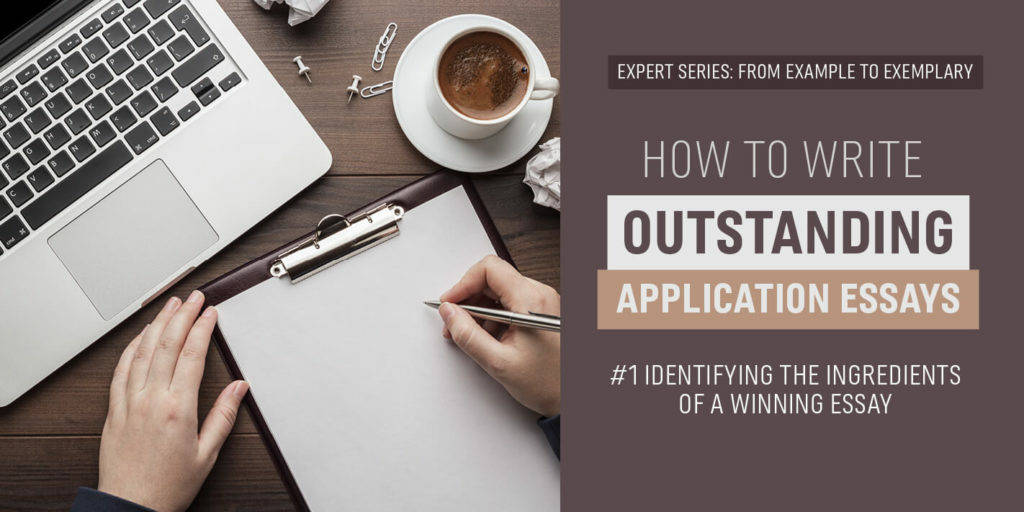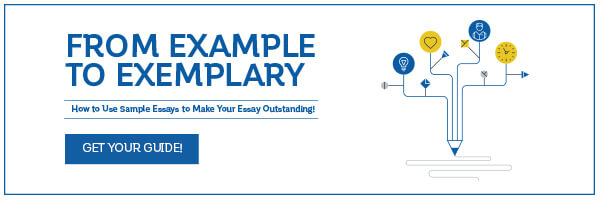
In our How to Write Exemplary Application Essays blog series, you’ll learn how to create outstanding essays by analyzing sample successful application essays.
Let’s jump right in and get started by looking at two sample essays to see what makes them so effective. The first essay, The Public Health Student, opens with a question:
“What if people lived healthier lives, practiced preventive medicine, and took precautions against illness and disease?”
The “what if?” opening immediately engages the reader and at the same time tells us that the writer’s career aspiration is in the healthcare sector. We do not have to wait to discover the theme of the essay; it’s right there in the first sentence.
In terms of structure, notice how every sentence in that first paragraph builds on the sentence that precedes it. In the second sentence, the writer begins to present his background in the healthcare field, making his opening question understandable. In the third sentence, additional background about his professional experience gives context for his choice of career path. By the end of the first paragraph, the reader understands the applicant’s motivations for moving from work as a physical therapist to the broader sphere of public health management.
As the essay develops, notice how this applicant continues to build his case for admission by linking his prior work and education to their relevance to the public health field. Specifically, he writes about coursework he has taken in public health, followed immediately by a succinct discussion of his field work experience. When writing about his internship experiences, he doesn’t simply list what he did; he talks about what he learned and how these experiences have solidified his commitment to getting the MPH degree. His conclusion is also very effective because he returns to his opening “what if?” theme. He asks, “What if an aspirin a day could prevent heart attacks?” emphasizing that everything he has learned and done so far keeps him riveted by the challenge of finding answers to significant questions in public health.
While the writing is not especially colorful in this essay, the prose is clear and active. Every sentence offers new or additional information; there is no fluff. This clarity and momentum keeps the essay interesting and the pace moving, effectively building the writer’s profile as a promising and serious MPH applicant.
Now let’s take a look at the Returning to School essay from Accepted’s law school section. This essay opens with a colorful, compelling scene that immediately places the reader in the story:
“Fourteen grumpy doctors stare across an enormous oak conference table at me. It is seven o’clock in the morning, and most of the group is still wearing wrinkled green scrubs indicating they worked through the night. None of the doctors look ready to digest the extremely technical information contained in the eight studies stacked neatly in front of them. My job is to present each study, review all relevant economic data, and answer any questions in such a way that the audience will conclude that the new drug I am selling is better than the one they have been prescribing. One of the physicians gruffly informs me, through a mouthful of Danish, that he is leaving in ten minutes so I had better start my pitch.”
Don’t you already feel for this writer and her formidable challenge? I don’t know about you, but she had me hooked right away, and I was rooting for her to win over this very tough audience.
This essay, about half of the length of the MPH essay, still contains the same winning elements: specific highlights of career achievements and clear and convincing reasons for a career change. The last sentence refers once again to the “grumpy physicians” we met at the beginning. Both writers brought their essays full circle.
Having reviewed these essays, you will have a better idea of the types of experiences you can pull from your life that can help build a case for your candidacy for grad school. Start thinking about experiences you have had that will create a compelling anecdote that can grab your reader’s attention from the first sentence and not let it go until they have reached the final, satisfying conclusion.
Summary Tips:
1. Open with a compelling anecdote or a question to engage the reader’s interest right from the beginning.
2. Hold the reader’s interest by building on your story, sentence by sentence, adding new information and avoiding repetition.
3. Refer back to your opening when you conclude your essay, bringing your story full circle.
In the next post in this series, we’ll show you how to choose a theme for your exemplary statement of purpose.
Work one-on-one with an expert who will walk you through the process of creating a slam-dunk application when you check out our catalog of application services. Our admissions consultants have read thousands of essays and know the exact ingredients of an outstanding essay.
Related Resources:
• 5 Fatal Flaws to Avoid in Your Statement of Purpose, a free guide
• 5 Elements to Telling an Attention-Grabbing Story
• 10 Tips for Better Essay Writing
This article originally appeared on blog.accepted.com.
Applying to a top b-school? The talented folks at Accepted have helped hundreds of applicants get accepted to their dream programs. Whether you are figuring out where to apply, writing your application essays, or prepping for your interviews, we are just a call (or click) away.
Contact us, and get matched up with the consultant who will help you get accepted!


